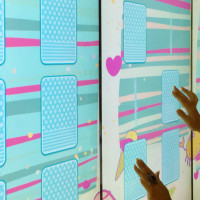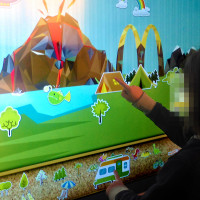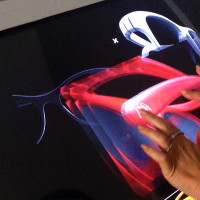
RETAIL
Choose the evolution in retail
Find out how we can help you create new in-store experiences that win over consumers and add value to your brand.
A Digital Menu Board is the evolution of the traditional printed menu, presented in a digital format.
Displayed via interactive screens or Digital Signage systems, it showcases the restaurant's food offerings. The Digital Menu Board can integrate QR Code systems that expand the content available to customers, enhancing customer engagement with information such as ingredients, calorie intake, the story behind a dish, and more.
Self-ordering systems, often combined with self-payment features, allow customers to place orders quickly and independently, encouraging them to order more.
When paired with self-payment, customers can also complete their payment without waiting for a waiter or standing in line, saving valuable time for both staff and guests.
Indirectly, these systems also significantly reduce staffing costs, as fewer waiters are needed in the dining area.
Yes, it has been widely proven that the entire ecosystem of digital restaurant solutions – from self-ordering kiosks to industry-specific management software, and even Family Areas designed for entertainment – helps restaurants reach more customers, increase revenue, and ultimately boost sales.
Digital solutions allow restaurants to reach a wider and more diverse audience, build customer loyalty, and gather valuable data through integrated analytics tools to personalize offerings and marketing strategies.
Digital menu content is easily managed through a dashboard accessible from any device (desktop, laptop, smartphone) or via a web interface.
Using a user-friendly visual control panel, restaurants can:
Upload all types of content they want to display to customers
Select which devices to publish content on (e.g., for chains with multiple locations and varying menus/offers/ads)
Schedule publication timing
Decide if and when to activate specific interactive content
Family-Fun Play Areas are high-entertainment digital corners typically found in restaurants, cafés, and shopping malls. They feature multi-user interactive solutions equipped with specially developed entertainment software: gaming platforms with interactive game suites designed to develop cognitive, logical, and problem-solving skills, as well as apps for reading newspapers and more.
These areas often include promotional and advertising messages from the venue and can also integrate self-ordering and payment systems.
No. Although the name may suggest they are only for younger audiences, Family-Fun Play Areas are designed for all potential customers. The restaurant can tailor its digital offering based on its target audience. For example, it can load games suitable for different age groups or choose the types of newspapers, magazines, and comic books available for reading.
The main advantage of Family-Fun Play Areas lies in the ability to diversify the restaurant’s entertainment and communication offerings, enhancing its marketing strategy.
Yes. Technology and digital solutions are universal. Digitalization is no longer just a trend—it’s an opportunity for all restaurateurs to improve operations, optimize management, and deliver a more personalized and engaging customer experience.
Both Digital Menu Boards and Family-Fun Play Areas can be customized in terms of size (to fit the physical space), placement, and content.
Restaurants of all sizes—from small, family-run establishments to large international chains—can benefit from the advantages of digitalization.
Digitalization is not only compatible with sustainability—it increasingly represents a core element of the restaurant industry. The trend of "Restaurant 4.0" is all about combining technological innovation, sustainability, and energy efficiency.
A practical example of immediate sustainable action in the HoReCa sector is the digitalization of menus, which reduces paper waste and the costs associated with printed materials.
Another key factor in promoting sustainability is the adoption of digital receipts. Their use helps reduce paper and ink consumption and lessens the environmental impact related to the production and disposal of traditional receipts.
Finally, all the latest technologies used in Family-Fun Play Areas must be eco-friendly to be considered truly future-oriented—built with low CO2-impact materials and low energy consumption. It’s a perfect blend of innovation, sustainability, aesthetics, and design.

Find out how we can help you create new in-store experiences that win over consumers and add value to your brand.

Recreation areas for children, playgrounds where young guests can play and compete with one another.

Creating a digital entertainment area for children, where they can tackle new challenges and socialize.

From the idea of a great artist: design, innovation and interactivity at Mido 2015.